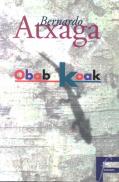





|
Hasiera · Home |
|
Ezaugarriak · Features |
|
Oharrak · Notes |
|
Sarrera · Introduction |
|
Euskara |
|
Folklore |
|
Kirolak · Sports |
|
Musika · Music |
|
Janedanak · Gastronomy |
|
Tokiak · Places |
|
Historia · History |
|
Politika · Politics |
|
Diaspora |
|
Internet |
|
Albisteak · News |
|
Nahas Mahas · Misc |

For security reasons, user contributed notes have been disabled.
by David Cox
| David Cox is employed as a writer and editor and lives in Ontario, Canada. David also contributes review articles to the U.S -based internet publ ications rambles.net and rootsworld.com, where he writes about European world-roots music, specializing in the music of Euskal Herria and Cymru-W ales. His hobbies include studying the Basque and Welsh languages and playing Euskopoli with his children. |
Bernardo Atxaga
Obabakoak
(Vintage, 1992; Editorial Erein, 1988)
 Obabakoak is Bernardo Atxaga's best-known book, the one that brought him a small international reputation. Yet it's perhaps his least straightforward novel. It's a novel that operates on several different levels of reality.
Obabakoak is Bernardo Atxaga's best-known book, the one that brought him a small international reputation. Yet it's perhaps his least straightforward novel. It's a novel that operates on several different levels of reality.
Bernardo Atxaga is the pen name of a writer called Joseba Irazu Garmendia, from Asteasu, Gipuzkoa. (Not so long ago, it was not a smart move to write in Basque under one's own name). A storyteller from Asteasu has access to the world's treasure trove of stories. But he chooses to write his own Basque stories as well.
While Atxaga is definitely a novelist, Obabakoak may or may not be a novel. It may be just a collection of stories. Connected or unconnected. It doesn't matter. There are no characters that you can follow all the way through the book, not even the village of Obaba which only appears and reappears from time to time. Obaba is a dark, mysterious place. A place where both local and universal stories are told. People from the outside are out of place there, and they stay that way. Nor is it all about Obaba. Parts take place in Hamburg, Peru, Castile, Iraq, and China. This is a Basque book and it is an international book.
(The title Obabakoak may or may not mean: The things and people of the village of Obaba; It may be just that obaba is the sound a Basque baby makes. )
This is a brilliant, moving book. It does not exploit the reader. It is about storytelling. It is about storytelling in a language understood by a small group of people: a people that understand that if they were to choose not to use Basque, they would be complicit in the death of one of humanity's oldest and most distinct forms of speech. There is not a political word in the book; it is all political. When a writer chooses to write in a language that is marginalized, it is a political act. There are no literary signposts for such a writer.
When you grow up under a dictatorship, you learn to use metaphor well. This is a book of many levels, many layers. In Obaba there is no political violence, no prison cells or torture. Or is there? There is a "prison" full of lizards. What does a lizard do? The lizard in this book is said to go into a young person's ear. After this happens, the person is never the same. Is the lizard a language? Imperialism? For the Basque writer there is, in the words of the narrator in the story that takes place in Villamediana, "no guiding thread, just a void scattered with islands." How has this thread been lost?
In Obabakoak there are Baghdad servants stalked by death; an Irish doctor who becomes a holy man in Amazonia; a dwarf who imagines himself a great poet. There is a boy who turns into a wild boar -- or does he? And a number of love affairs which seemingly take place only in the mind of the protagonist.
In one such story, Esteban Werfell is a half-German, half-Basque boy growing up in Obaba; his German father concocts a scheme to ensure he does not become just another village boy but that he aspire to something "higher," that being German culture and education. Indeed, such prejudices against the Basques and other marginalized peoples are never far from the surface.
In another, a man bent on revenge who concocts an incredible scheme to terrorize an occupied city in China. When the "terrorists" are caught they are tortured. But they cannot tell the torturer either where they are from or who sent them because they do not know. In fact, they believe they have been sent by the prophet Mohammed, from paradise. Another Basque metaphor?
There is also the "game of the goose" in which the Basque writer, perhaps, advances square by square. And despite all the odds against, and the prejudices of his own people and others, the writer does advance.
All of these stories are Basque stories; they are universal stories. Obabakoak is simply stories about the place where the world takes the name "Euskal Herria."
David Cox
|
Please report any problems or suggestions to Blas. Eskerrik asko! |





